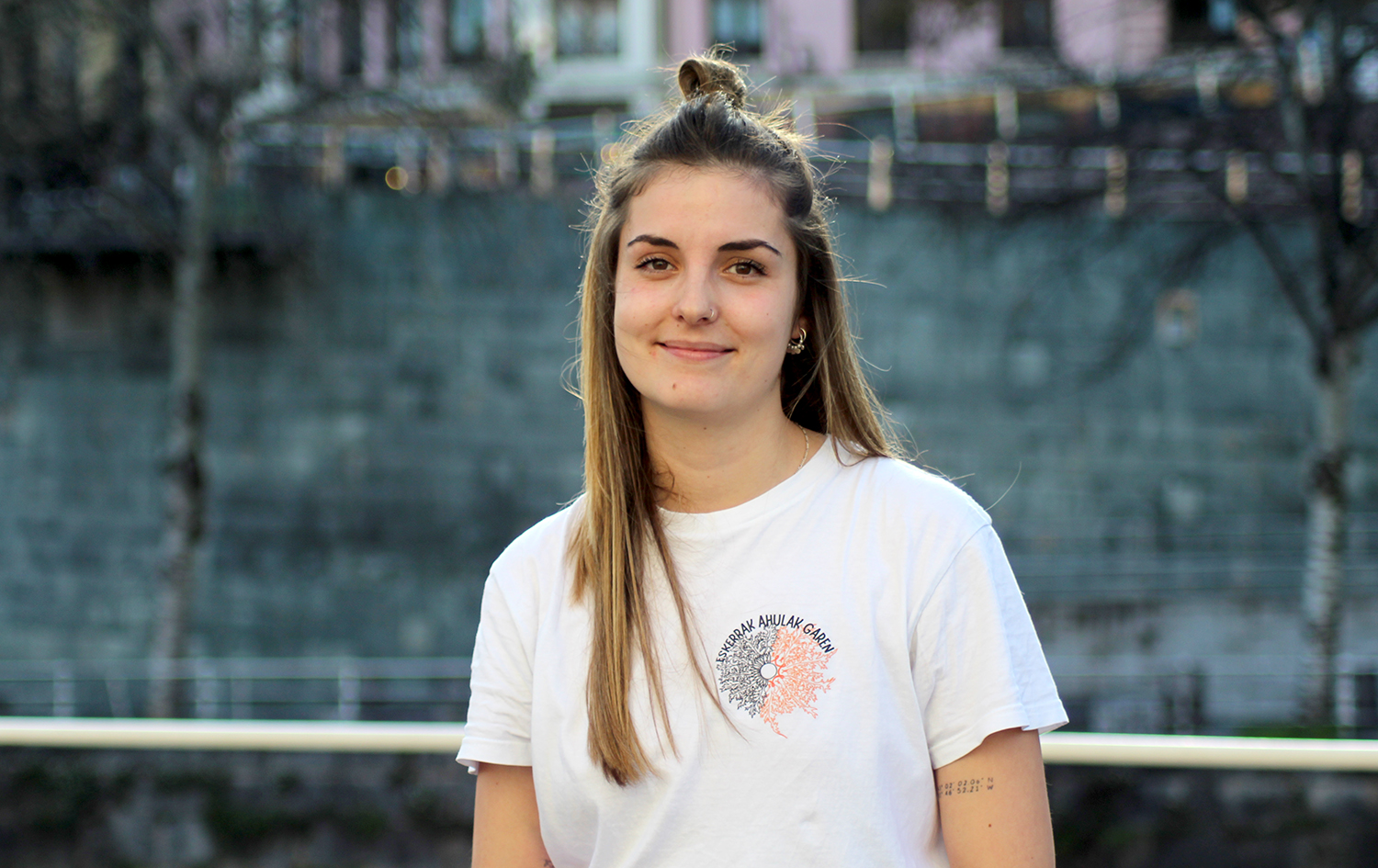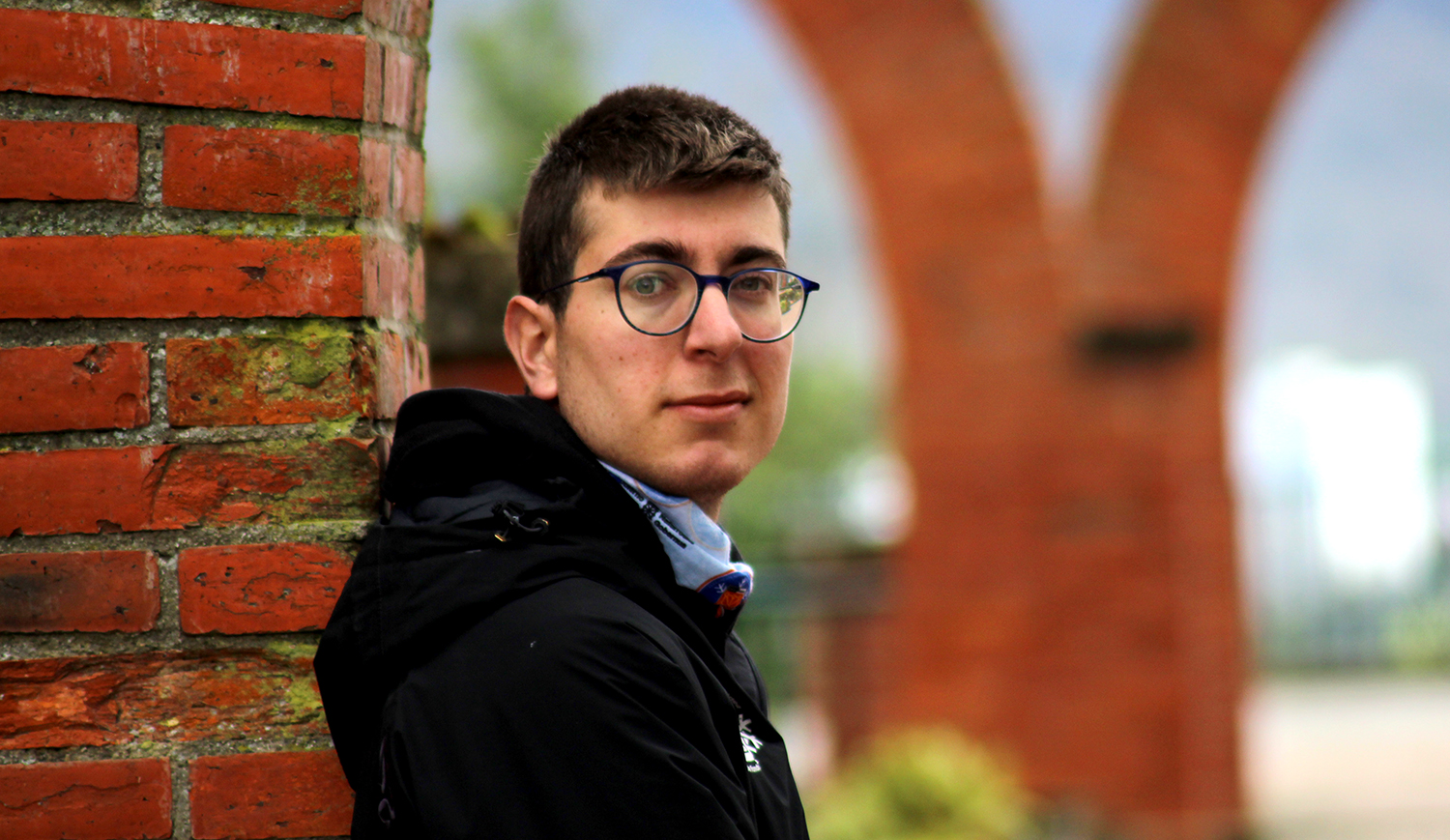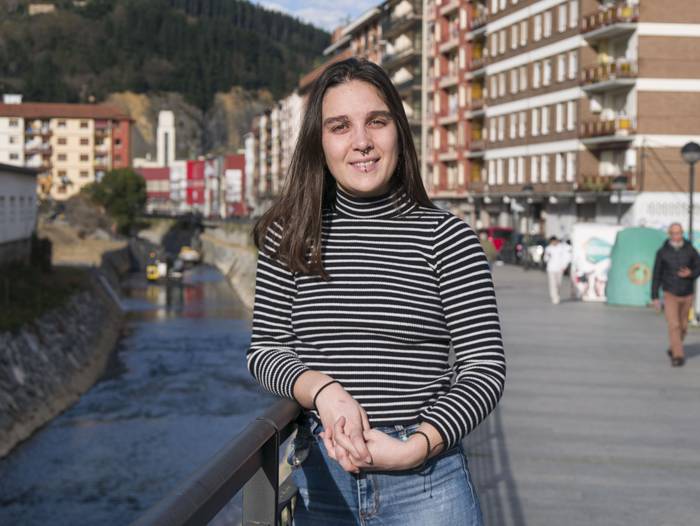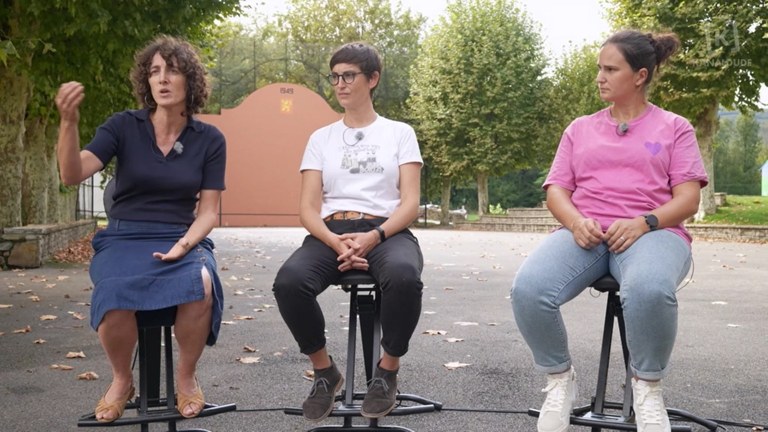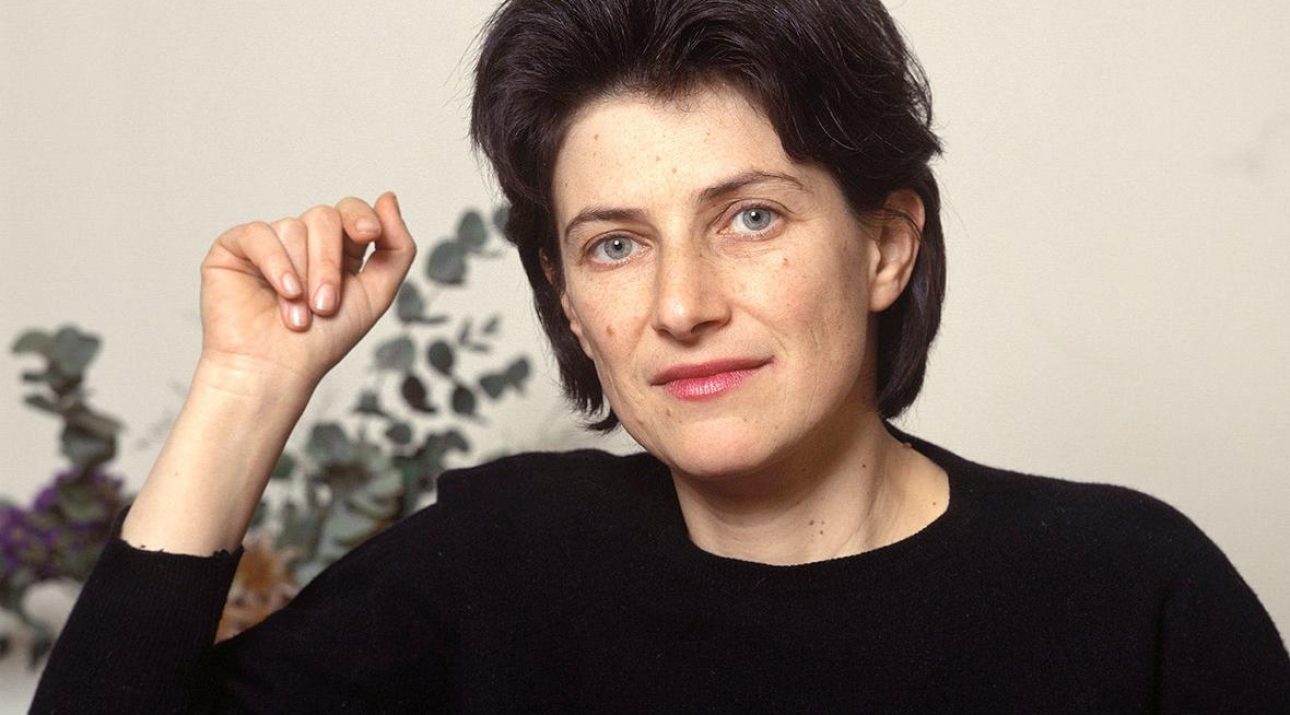"We are not for revanchist and denial feminism"
- Who said it was easy to be who? Who is who?
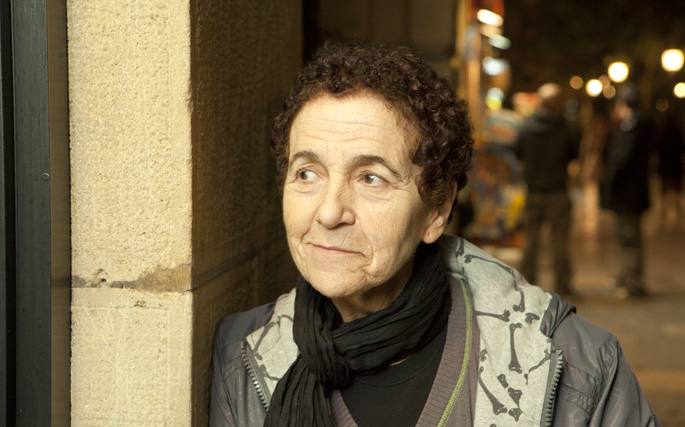
How do you remember Hernani's childhood?
I don't know if I deny sad memories, but I have perfectly happy memories. I remember a lot of the times I spent in my grandfather’s farm: my grandfather was a healer and from farm to farm I accompanied him to heal the sick. I learned from my grandfather how beautiful it is to heal, to heal wounds. I also have wonderful memories of the street: how we played. My favorite games were not particularly feminine, on the contrary. My mother had a butcher shop in Hernani, and her clients said to her: “There’s Amparito, even now his ass is higher than his head!” Because I was always working on plates, laps (with chromes)... The childhood in Hernani was beautiful.
How have you been influenced by where you were born, by the time and the situation to become who you are?
Deep into the depths. Although I am an urban girl, and I have lived first in Barcelona and then in Madrid since 1964, I have never stopped loving people’s lives: I learned to love people’s close relationships as a child, and I have not forgotten it because it was there that I learned how important human relationships are. I don't like being part of a world that I don't know or know. The fact that I was born in 44 also affected me a lot, of course. I was born after the war, in a time of terrible repression. His maternal grandfather was a socialist, and in 36 he won votes for the Popular Front throughout the Urumea Valley. His father, on the other hand, was a man of the regime, no matter what regime he belonged to, but of the regime. He was a man of order, always of the regime. In the house, as in most of the houses of the time, we could not talk about politics, but we had eyes and we were aware of what was happening, which made me very anxious: I heard my mother that she could not speak Basque, she had only been in school for 9 months, but several times she had to wear the ring... I remember that these things made me very angry. I was lucky enough to get to know the scout movement, and it was there that my instinct for justice was awakened: not to accept marginalization. I think all of them influenced me to be who I am today.
Your political activity began in the last years of Franco’s dictatorship within the Communist Movement. But you soon became a feminist activist. “After many years of anti-Franco militancy, I moved towards feminism in 1975,” she says. How did you go about forming politically, ideologically and identically?
It's kind of weird. I was a lesbian, but I didn’t realize it until the end. Well, I did notice, but I didn't give him a name. I gave it a name in 1964, when I was 20. A friend from the faculty told me: “Amparo, let go of those silly little friends: you’re a lesbian from top to bottom.” Until then, I hadn’t lived my lesbian life badly, but I didn’t say it. In his current words: I didn’t leave the closet, not even with those closest to me. But I didn't live badly. I had a double life: on the one hand, I used to hang out with lesbians I’d met in Madrid, stay in their homes... And on the other hand, there was life outside of that environment. For me, discovering feminism was finding a way to reconcile and channel my instinct as a fighter, as a vigilante and as a liberator, as a woman and as a lesbian. For the first time, I became a woman, unlike before. Until then, I had always been among boys and I did not feel undervalued, I was a perexilla of all sauces and I did not feel discrimination. I remember, as a child, in Hernani I had a gang of girls and a gang of boys, and in the gang of boys I was the boss! I felt undervalued not in Hernani, not in school, not in university... and I was part of the clandestine associations of the university! Before the Communist Movement, we founded an association called the Communist Federation. At that time it was very easy to create political organizations: it was enough to bring together four or five people, to create the name and rules of operation, to define the political line... and go ahead! This organization joined the Communist Movement and I joined the leadership. Even there, I felt the members as equals, I was not aware of discrimination and, imagine, the members of the Communist Movement did not take into account, not even on a theoretical level, the little that the founders of Marxism had said until then in the struggle for women’s liberation. Not even that little bit. That’s why, in 1975, everything was turned upside down, it was a huge revolution. An ideological revolution, a huge ideological twist. Everything has changed. As one member of that time, a Galician journalist with whom I still have a lot of friends, always says, “nothing was the same again.” I'll never do it. Since feminism came into our lives, nothing has ever been the same. I feel so identified with the struggle for women’s liberation that it would be impossible for me to tell my life, or to think of my life going forward without considering this awareness. Those who have seen the world from this angle know that everything changes, and once I’m wearing these glasses I can’t ignore them, the feminist look in depth is part of my identity.
It’s been 35 years since you started fighting for women’s rights and freedom. How do you see the feminist movement today? Has the transmission been generational?
The situation we encountered in the late 1970s is not comparable to the current one. We came from 40 years of Freemasonry, and there were traces of Freemasonry everywhere. The year 1975 was declared International Year of Women by the United Nations and the Spanish government had to carry out such a rapid facial cleansing to be able to participate in the meetings of the United Nations. But of course, education, culture, values... were still Francoist in Spain. The female model of the time belonged to the female section of Freemasonry, imagine. We had to fight hard to get absolutely basic issues, like proclaiming that women are also sexual beings. That we also like sex, and not only warmth and pampering, but also sex. Of course, young women today say this and laugh, but in our time it was a terrible struggle. And I think we had more respect than the men said to themselves. We told them that their sexuality was not an uncontrollable flood, which was born in the mountain and destroyed everything in its path. We told them that they also had the ability to control themselves, and that the fact that a girl was wearing a miniskirt did not justify this seemingly uncontrollable flood. “No stories,” I told them. Therefore, in the face of the situation that we encountered at that time, we had several fights, several fronts open, in each and every area of life: in the area of sexuality, in the workplace, in education, in the family, in health... Little by little, we started to get some things, little, but some yes. Some at 60%, others at 40%... We were moving forward little by little. I think the only thing we’ve achieved 100% is gay and lesbian marriage law. We achieved that 100%. Women who have been born 30 years later in public life are born with many achievements already achieved and, therefore, the way to face reality is different. Today’s young women see that there are no jobs that are forbidden to them (although the glass ceiling is very low, but this is not seen until they get very close...) that there is no education that is forbidden to them, that contraceptives are not forbidden and that some of them can be found in public health, that the prohibition on abortion is not absolute, that they have partially decriminalized... and above all they see that women are considered socially, not as a second sex, as a second-class citizen, but as a whole person. The Women ' s Institute had also been established, and the Administration took into account some of the demands of women... This has been very important: in our time feminists were the only ones who demanded and claimed rights for women. Today, more and more women are raising their voices for their rights and government institutions are also talking about equality, family planning,... This change of circumstances has changed the way we approach feminism. I would say that the feminist movement today does not have the weight it had at the end of the 70s, sometimes I don’t even dare to talk about the movement... Yes, there are feminist organizations, many of them working on very specific issues, and periodically explosions occur: for example, during the feminist days in Granada last year. Suddenly, as if coming out of the void, 4,000 feminist women of all ages came together in Granada, and that is energy in the veins, but this force must be maintained at all times of the year and in all geographical corners, and the network must be strengthened further. Of course, in the beginning, we were carrying out very concrete and vigorous campaigns: those for the right to divorce, those for the right to abortion... the current challenges are more difficult because they are less obvious and must be explained well to the public.
The phrase that is increasingly heard is “I am neither a feminist nor a machista”.
Yes, and it's very worrying. It’s funny because, in the beginning, the work of the feminist movement was very well received in the media, of course in the porgressive media. The feminist movement was welcome: it was something new, a breath of fresh air, and it was very well received as a novelty. At that time, the word feminism had a positive echo, and we insisted that feminism was not about turning the system around, exchanging power relations, that feminism was about women’s freedom and that it was against power relations. In recent times, we have very little interest in the media. In Granada we met 4000 women and they did not make any specific case for us in the state media. It has been taking over the body because feminism is a matter of four crazy, hysterical, mischievous and frustrated people. Such lies, such as this aberration of the pairing of feminism and machismo, are gaining strength. And it’s our job to turn this around, we have to push ourselves to expose ourselves to the way we are in the media: peaceful, enthusiastic, transgressive people (because feminism can’t be without transgression, because we still have a lot to transgress). It is not enough to reduce feminism to equality; feminism is equality, but also the struggle for the construction of a social structure that includes the emancipation of women. For this, feminism proposes social changes of great magnitude and we can not reduce it to the official discourse.
What should young women learn from older women? And the other way around?
A very interesting question. I always say: either we will make that transmission, or ours will be a simple generational adventure. And cursed that feminism will become the adventure of a generation!, especially because there are still many things to do. We have to learn from each other. I think that our generation must have a lot of humility, and we have to get it out of our heads that we have many years of experience, that we have a lot of experience and that as young people have just arrived they have to listen to us. We cannot think, because we have been in the feminist struggle for many years, that young people should pay attention to what we say. That would be an unforgivable mistake. We need to be much more humble and willing to review many of the things we thought at the beginning of our feminist journey. Sometimes I meet the members of the hour and I say “what time is it?” and they say “a little over six” and I say “hey, the clock stopped 30 years ago!”. If we are not able to see the changes that have taken place, we are useless. In the family, for example. The family model we found was unique: the traditional family, the patriarchal core, based on the marginalization and oppression of women (most of them forced to marry from the church, without the right to divorce...). Now, on the other hand, there are families of various kinds: single-parent, formed by two women or two men, sometimes with children from previous heterosexual relationships... We can’t talk about family and marriage in the same way as before! And we can’t criticize gay marriages because that’s strengthening marriage! Have we gone crazy? Social imagery is revolutionizing gay marriage rights! And some gay and lesbian couples adopt children... So, for our part, I would sum it up in this way: we need humility and a tendency to review and renew ideas and a great will to pass the witness. We have to know how to pass the witness in time and delegate the responsibilities to others, otherwise we will be very wise feminists, but together with us we will bury feminism. I would ask young people to tolerate the older ones... I know that sometimes we can become grandmothers’ dragonflies by constantly counting battles, but, what are we going to do to her, we are getting old and everyone likes to tell us what she lived... But well, with a little patience... (laughs) And on the other hand, I think it might be interesting for young people to learn from what our generation did for the liberation of women. Not to repeat the same, but to know where they come from, above all, not to forget that we have never been given anything to depart from. Everything we have achieved has been achieved with our struggle, nothing has fallen from the sky. We have gained accomplishments through movement, popular activation, struggle, and awareness. It is very important to be aware of this, especially at times like now, because it is very possible that part of our conquests will go to waste. Some achievements are very passionate and difficult to extract, but in others there is a high risk of setbacks. It is very important that, at a time when historical memory is in vogue, the historical memory of feminism is also made.
Today, it seems that a gender perspective has been internalized in different fields: politics, culture, education... But what if there is a feminist consciousness, a liberating consciousness? Or does “purple fashion” have more of the superficial?
In the feminist days in Granada, for example, feminist consciousness was very present. The ceiling was very high. The key is how to maintain this gasoline blaze of the days throughout the year. It has no continuity in terms of organization, coordination... There is the State Coordinator, who coordinates more than twenty feminist groups, but has less strength than he should. It does not have the power to carry out vigorous campaigns that were carried out in the early 1980s. The campianos of the time were incredibly strong, like the one of abortion. That’s why it’s hard to raise feminist awareness. Those of us who are part of the movement have a lot of inclusiveness, we do not lose track of ourselves, but it is true that it is difficult to spread it. There is not much strength. If they are feminist nuclei, with a certain coordination, but there is no movement by the force that we had twenty years ago. And this force is necessary for certain demands to continue, for new ones to emerge, for feminist consciousness to expand, for feminism to be renewed, for the government to sell, but to rise to its aspirations by leaving it in the void... We can’t forget that some things have been done well by the government, but most of the intentions have been left in the middle or in pure intention or because they don’t have a budget, or because some autonomous communities don’t want to know anything about what the central government is saying, or because they are afraid of the opposition... That is why feminists must be there, because in the face of many factors, even the central government is backward. There are many powers that want to put obstacles to the emancipation of women, and if we are not there, there will be setbacks again. We can't get caught up, we still have to be vigilant.
You are part of the “Other Feminist Voices” stream. Do we need to understand that in addition to hegemonic feminism there are also peripheral feminisms?
There is more than one feminism. “Other Feminist Voices” is a stream of opinions that emerged in 2006 as a response to official feminism. The official feminism or the “purple fashion” that we see in the media wanted to shut the mouth of the Dean of Judges of Barcelona. He advocated that the General Council of the Judiciary prohibit him from demonstrating. Against this, we made a collection of signatures to send to the General Council of the Judiciary and, by the way, we gave our opinion about the reforms of the law of macho violence that the PSOE government was working on, about divorces, about the law of dependency... We were terrified by the government’s attitude towards macho violence: totally punitive thinking was prevailing, as if the only solution to all the maladies of men was prison. We saw the danger of returning to essentialism. It seemed that just because he was a man, he had to be essentially evil: aggressive, deadly in his relations with women... And women, on the other hand, all good, pleasant and harmless. We could not accept such a trend: in the first place, no one is as he is in nature, in essence. We're doing it. Let us not forget the old Simon of Beauvoir. On the other hand, when we talk about ill-treatment, we are talking about a minority in relation to the integrity of society. Let's not distort the men. And on the other hand, we cannot forget that the feminist movement, in its beginnings, fought a tremendous battle against prison policy, against prisons. And now it seems that we want a state full of prisons in which all the bad men are put. With a favor! That's not our model. We were very outraged by these positions of official feminism and that is why we decided to continue this collection of signatures, creating a network of critical feminist thinking. It appeared in the media to say that we did not share that feminism, to imply that feminism was more than that. And to make it clear that we were not in favor of denial and revanchist feminism. On the other hand, the “Other Feminist Voices” stream defends the rights of sex workers who work with their will, while denouncing cases of coercion and exploitation, and trafficking in women. This official feminism makes us eternal victims.
Does the feminism you advocate work against victimization?
Of course, of course. In official feminism it seems that women are unable to take care of themselves, it seems that they must constantly protect us... When we started with feminism, one of the first things we did was to rebel against the falsely protectionist laws of Francoism. When we made it clear that women don’t need this overprotection, that it doesn’t do us any good and that it doesn’t allow us to grow, to be autonomous, to take power. What we need are tools, and the government must make these tools available to us so that we can defend ourselves, so that we can be autonomous, so that we can take in our hands enough power to protect ourselves. We don’t always want to go to the “father state” for protection, that doesn’t help us at all. It should not be the “father state” that protects us from the attacks of men. Education and prevention are the paths, but the government seems to have chosen the path of denial and revanchist. Women who have been abused are not heard, they are not taken into account. As if what these poor victims have to say doesn't matter at all. It’s the same if a battered woman says she doesn’t want a protection order, the “parent state” decides yes and that’s it. They may say they don’t want to file a complaint, but instead of thinking about other ways to address the problem, the government will insist on filing a complaint. We're older! They can't treat us like we're little kids. No work is done to empower these women to be autonomous and sovereign: they become eternal victims. And that way we're not going anywhere. The role of the victim woman scares us, women who always need protection, waiting for them to be saved... There is no better food for the patriarchy.
“The publicity and morbidity that is given to each case does not help,” he says. What is behind this journalistic treatment?
I will not say that it is done with malevolent intention, but the journalistic treatment that these cases undergo reinforces the images previously criticized: the image of the poor victim and the image of the malevolent aggressor. And he perpetuates each one in his role: the aggressor will forever be the aggressor and the victim will forever be the victim. Strong wicked against the good and the weak. What a beautiful movie. That’s the message we get. I think that proganda, the treatment of morbid news, doesn't do anyone any good. In addition, most of the news about ill-treatment only comes to the surface when a murder has occurred, usually without giving a voice to women who would be able and willing to speak as a child. When a woman appears in the media in connection with abuse, she is either dead or exposed as a poor victim. There is absolutely no education for the prevention of abuse, starting from a very young age: we have to liberate relationships from games of power and dependence, which is learned, which can be shown. It is useless that 20 years later this boy is imprisoned and that this girl becomes an eternal victim. Let’s tackle the problem from the root. We must educate both girls and boys in relationships of good treatment. There is a program called “good deals” that is working very well in schools. It wasn’t so many years ago that I heard that there were some boyfriends and a friend told the groom to “get home with a good slap, it’s the same if he doesn’t understand, it’s the same if he doesn’t understand why you gave it to him, but that’s how he’ll get used to it.” I've only heard that for forty years. That’s where we come from, so we have to start educating children from an early age, because the machismo that exists in society will not disappear overnight.
You’ve been fighting homophobia for decades and you were the first woman to say “I’m a lesbian” on TV. What forms does homophobia take in the media today?
There are many cases of homophobia. Laughing at the typical and topical Marika is a classic, but there are many other ways, more subtle, more indirect. We hear homophobic jokes over and over again on TV and nothing happens. I often say: the day someone makes a homophobic joke on the bar of a bar and a man cuts it off will be a great advance. “I didn’t like it”, that’s enough to say, but most men don’t dare to express their discomfort, fearing that they will also be included in the gang of mariks, or with the respect due to the rebels. And the same with jokes or macho attacks, when men become thermometers of men, we will advance. It is very important that other male models also take power, we cannot live in the realm of eternal rebels. This seems to me much more important and more effective than the “red card” of that announcement that was issued by the Ministry of Equality. The fight has to be a daily one, and telling someone “I didn’t like that” doesn’t mean you’re going to take out the red card, discard it and deny it, but you’re going to express your discomfort. Media silence can also be homophobic to the extent that it causes invisibility. Homophobic attacks in schools are ignored in the media, although verbal and physical attacks occur daily, homophobic bulling is a daily bread, but it does not resonate in the news. The way in which the boy who is not a macho remains at the mark is homophobia, homophobia is the axis for the construction of masculinity in boys. It's still there.
What does feminine offer to men?
I wouldn’t dare to talk about feminism in general, because, as I said, some offer them prison. But I think that the feminist movement, as I understand it, and this has always been the core of the movement, offers them something that I think is wonderful: the opportunity to build and live their masculinity in a different way, to reinvent their relationships with women, to live power in a different way... With all that it means. Feminism offers them all the happiness and satisfaction that the removal of the shell of prototypical masculinity can give them: to be able to express feelings, to enjoy the care of children and adults, to regain the right to play, enjoy, move and dance, to abandon the need to always be serious and sure... Try new forms of masculinity, deconstruct and begin to build. Access to areas that have been banned for masculinity. I enjoy looking at new parents, watching how they enjoy taking care of their children. A few years ago it would have been unthinkable, since warmth and care were exclusive spaces for women. The groups of men who are expanding here and there are doing a great deal of work in this regard. And from feminism we need to review the message for men and explain everything we have to offer them. We need to make concrete proposals.
For many years you have worked at the Isadora Clinic in Madrid. How would you explain the work of this clinic in the fight for female emancipation?
Since the public health system has not taken responsibility for abortions (only 2% of abortions are performed from the public health system), since it has completely escaped this responsibility in a lying way, the Isadora clinic has paved the way for many women to have an abortion. All the women who go to the Isadora clinic find professionals who welcome them, listen to them, inform them, and not reprimand them, as has happened to many in public health. The professionals of the Isadora Clinic know that the rhythms of each culture are different, and due to the large influx of immigrants, we try to give special attention to each woman so that they feel protected and comfortable. And we give them the opportunity to call us 24 hours a day, in case of any doubt, fear or problem. Although it has been in an autonomous community governed by the PP for a long time, Clínica Isadora has also been helping officials working for Sermas (Health Service of Madrid), who have tried to finance as many abortions as possible from public health. Isadora performs an ultrasound and psychiatric report free of charge to women so that they can go to Sermas and be included in the lists of funded abortions. At first they were very cool, but more and more abortions are funded by Sermas.
0
You are the director of the collection “Hablan las mujeres” (women speak) of Editorial Talasa. What can we find in this collection?
This collection was born in the era of a need that arose during the time when the current Talasa publishing house was called Revolution: we missed a differentiated collection for books that disseminated feminist theory and for feminist literature and essays. There was a huge gap in the field of sexuality in the Spanish book industry, not to mention in books about lesbianism or sex workers... We also publish feminist literature and poetry. This collection allows, on the one hand, to enjoy literature written by women and, on the other hand, to learn from theories, essays and books of thought written by women and men in favor of feminism.
Indartsua, irribarretsua eta oso langilea. Helburu pila bat ditu esku artean, eta ideia bat okurritzen zaionean buru-belarri aritzen da horretan. Horiek dira Ainhoa Jungitu (Urduña, Bizkaia, 1998) deskribatzen duten zenbait ezaugarri. 2023an esklerosi anizkoitza... [+]
Gozamen aparta bezain deskribatzeko zaila dakar, norbaiten hitzak irakurri edo entzun ostean, zera pentsatzeak: “Horixe zen neu aurreko hartan azaltzen saiatu nintzena!”. Idazlea eta itzultzailea da María Reimóndez, eta galegoz aritzen da, hizkuntza... [+]
Orain arte desgaituak ez diren pertsonekin lehiatu da Uharteko Ipar Eski Taldeko Eneko Leyun eskiatzailea (Iruñea, 1998). 2024-2025 denboraldian, lehenengo aldiz parte hartu du Adimen Urritasuna duten Pertsonentzako Iraupeneko Eskiko Espainiako Txapelketan. Urrezko... [+]
Joan den urte hondarrean atera da L'affaire Ange Soleil, le dépeceur d'Aubervilliers (Ange Soleil afera, Aubervilliers-ko puskatzailea) eleberria, Christelle Lozère-k idatzia. Lozère da artearen historiako irakasle bakarra Antilletako... [+]
Endometriosiaren Nazioarteko Eguna izan zen, martxoak 14a. AINTZANE CUADRA MARIGORTAri (Amurrio, 1995) gaixotasun hori diagnostikatu zioten urtarrilean, lehen sintomak duela lau urte nabaritzen hasi zen arren. Gaitz horri ikusgarritasuna ematearen beharraz mintzatu da.
Duela aste batzuk, gurean egon ziren El Salvadorko eta Kanarietako emakumeen eskubideen aldeko hainbat aktibista. Sexu- eta ugalketa-eskubideez eta eskubide horiek urratzeak emakumeengan dituen ondorioez aritu gara; hala nola El Salvadorren berezko abortuak izanda homizidio... [+]
Zuberoako ohiturei buruzko bi liburu ditut gogoan. Batek XX. mendean aritu izan diren 180 dantzari eta soinulari aipatzen ditu. Haien artean, emakumezkorik ez da agertzen. Besteak, pastoralei egiten die errepasoa eta hor emakumeak aipatu aipatzen dira, baina omisio esanguratsuak... [+]
1984an ‘Bizitza Nola Badoan’ lehen poema liburua (Maiatz) argitaratu zuenetik hainbat poema-liburu, narrazio eta eleberri argitaratu ditu Itxaro Borda idazleak. 2024an argitaratu zuen azken lana, ‘Itzalen tektonika’ (SUSA), eta egunero zutabea idazten du... [+]
Donostiako Tabakaleran, beste urte batez, hitza eta irudia elkar nahasi eta lotu dituzte Zinea eta literatura jardunaldietan. Aurten, Chantal Akerman zinegile belgikarraren obra izan dute aztergai; haren film bana hautatu eta aztertu dute Itxaro Bordak, Karmele Jaiok eta Danele... [+]
Antifaxismoari buruz idatzi nahiko nuke, hori baita aurten mugimendu feministaren gaia. Alabaina, eskratxea egin diote Martxoaren 8ko bezperan euskal kazetari antifaxista eta profeminista bati.
Gizonak bere lehenengo liburua aurkeztu du Madrilen bi kazetari ospetsuk... [+]
Pertsona lodiek lodiak izateagatik bizi izan duten eta bizi duten indarkeriaren inguruan teorizatzeko espazio bat sortzea du helburu ‘Nadie hablará de nosotras’ podcastak. Cristina de Tena (Madril, 1990) eta Lara Gil (Fuenlabrada, Espainia, 1988) aktibista... [+]












